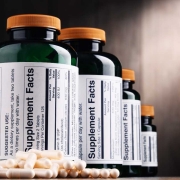Sleep Supplement Study Exposes Label Inaccuracies
During the Covid-19 pandemic, many people turned to sleeping pills and supplements to improve disturbed sleep cycles either for themselves or for their children.
In 2022, prompted by a large increase in pediatric melatonin poisonings, particularly during the pandemic, researchers from the Cambridge [MA] Health Alliance and the University of Mississippi looked to assess several brands of the popular sleep supplement, melatonin. What they specifically wanted to examine was the quantity of melatonin as compared to its label and if any other non-labelled ingredients such as cannabidiol (CBD) were present.
The study, which was published in JAMA in April 2023, looked at 25 over-the-counter brands of melatonin gummies and found that most of them (88%) contained more melatonin than the labeled quantity, in some cases far more, and five brands even contained CBD! While the study only looked at a small sample of supplements, this is not very reassuring for the supplements industry.
To understand how this can happen you have to understand how the Federal Drug Administration (FDA) “regulates” supplements. The FDA does not approve dietary supplements before going to market; their role in regulating supplements begins after the product is available to consumers. According to the Dietary Supplement Health & Education Act of 1994 (DSHEA)
- Manufacturers and distributors of dietary supplements and dietary ingredients are prohibited from marketing products that are adulterated or misbranded. That means that these firms are responsible for evaluating the safety and labeling of their products before marketing to ensure that they meet all the requirements of the Federal Food, Drug, and Cosmetic Act as amended by DSHEA and FDA regulations.(1)
- FDA has the authority to take action against any adulterated or misbranded dietary supplement product after it reaches the market.(2)
Again, it is the manufacturer’s responsibility to provide a good, safe product that is effective and free of impurities and contaminants. The FDA will act only when an issue has been brought to their attention.
Now, are all sleeping aids bad? Do you have to stop buying supplements? Absolutely not. But we must work within the framework we are given, which means when it comes to buying supplements, making sure you’re buying from a trusted source.
Once restricted to just our patients, in 2021 we opened The Kaplan Center Store to the public. Now anyone looking to buy high-quality supplements can access our store. Our providers have taken the time to vet every one of the manufacturers we carry and can attest to the fact that they provide a quality product that’s been thoroughly tested and contains the ingredients it claims to contain.
Supplements are not a replacement for a healthy diet and lifestyle but can provide essential nutrients and support when deemed necessary. And remember, before you start taking any new supplement or medication, make sure to talk to your provider to avoid any possible drug interactions or adverse reactions.
We are here for you, and we want to help.
Our goal is to return you to optimal health as soon as possible. To schedule an appointment please call: 703-532-4892 x2
(1),(2) U.S. Food & Drug Administration / Dietary Supplements









Leave a Reply
Want to join the discussion?Feel free to contribute!